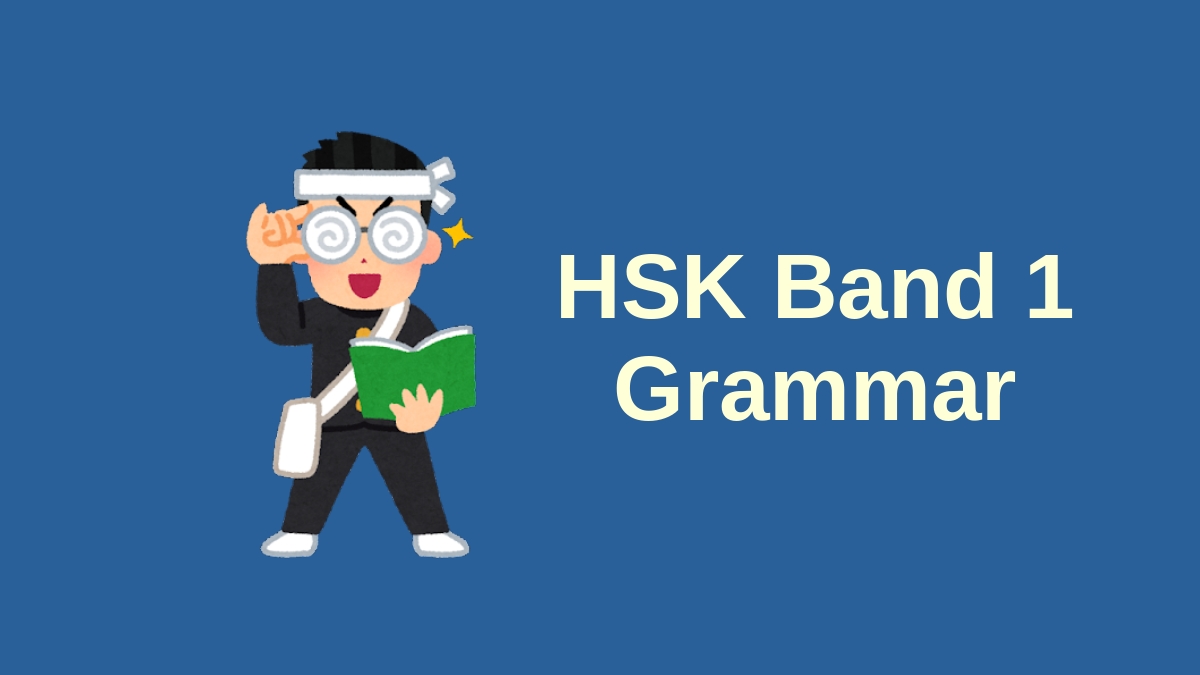In March 2021, Ministry of Education of the People’s Republic of China released the new Chinese Proficiency Grading Standards for International Chinese Language Education. The new standards have been officially implemented on July 1, 2021.
HSK Official has announced that the new HSK test 3.0 will be divided into three levels and nine bands. Lists for both grammar and vocabulary are updated too.
Elementary: Band 1-3
Intermediate: Band 4-6
Advanced: Band 7-9
This post lists the New HSK Test 3.0 Grammar Band 1:
| HSK | Chinese | Pinyin | English | Sentence | Sentence Pinyin | Sentence Translation |
|---|---|---|---|---|---|---|
| 1 | 什么 | shénme | what | 这是什么? | zhè shì shénme? | What is this? |
| 1 | 什么 N | shénme N | what kind of N | 那是什么书? | nàshi shénme shū? | What book is that? |
| 1 | 不是 | bùshì | not to be | 我不是美国人。 | wǒ bùshì Měiguórén。 | I am not an American. |
| 1 | 是 | shì | to be | 她是老师。 | tā shì lǎoshī。 | She is a teacher. |
| 1 | 吗? | ma? | right? | 你是老师吗? | nǐ shì lǎoshī ma? | You’re a teacher, right? |
| 1 | 谁 | shéi | who | 她是谁? | tā shì shéi? | Who is she? |
| 1 | 哪 M N | nǎ M N | which N | 哪个人? | nǎ gèrén? | Which person? |
| 1 | (的) | ( de) | ’s | 她是我 (的) 老师。 | tā shì wǒ ( de) lǎoshī。 | She is my teacher. |
| 1 | N 呢? | N ne? | what about N? | 我是中国人,你呢? | wǒ shì Zhōngguórén, nǐ ne? | I am Chinese, what about you? |
| 1 | 几 M N | jǐ M N | how many N | 你有几个汉语老师? | nǐ yǒu jǐge Hànyǔ lǎoshī? | How many teachers do you have? |
| 1 | 一~九十九 | yī~ jiǔ shíjiǔ | 1 ~ 99 | 九十一 | jiǔ shí·yī | 1 - 99 |
| 1 | AGE 了 | AGE le | became AGE | 我40岁了。 | wǒ40 suì le。 | I’m 40 years old. |
| 1 | 多大 | duōdà | how old | 你女儿多大了? | nǐ nǚ'ér duōdà le? | How old is your daughter? |
| 1 | 会 V | huì V | know how to V | 我会写。 | wǒ huì xiě。 | I know how to write. |
| 1 | 很 | hěn | very | 我很好 | wǒ hěn hǎo | I am good. |
| 1 | 怎么 V | zěnme V | how to V | 这个怎么读? | zhège zěnme dú? | How do you read this? |
| 1 | 月、号/日、星期 | yuè、 hào/ rì、 xīngqī | (telling dates) | 九月二号/日星期四 | Jiǔyuè èrhào/ rì Xīngqīsì | Thursday September 2 |
| 1 | (omitting 是) | 我汉语老师33岁。 | wǒ Hànyǔ lǎoshī33 suì。 | My Chinese teacher is 33. | ||
| 1 | 去 PLACE V | qù PLACE V | go to PLACE to do V | 我去学校学习。 | wǒ qù xuéxiào xuéxí。 | I go to school to study. |
| 1 | 想 | xiǎng | to want | 我想看书 | wǒ xiǎng kànshū | I want to read books. |
| 1 | 多少 N | duōshao N | how much N | 你有多少汉语老师? | nǐ yǒu duōshao Hànyǔ lǎoshī? | How many Chinese teachers do you have? |
| 1 | 个 | gè | (measure word) | 五个学生 | wǔ gè xuésheng | 5 students |
| 1 | 口 | kǒu | (measure word) | 我家有五口人。 | wǒ jiā yǒu wǔ kǒu rén。 | There are 5 people in our family. |
| 1 | 元/块 | yuán/ kuài | (currency) | 一元/块 | yīyuán/ kuài | one yuan |
| 1 | 在 | zài | at | 他在椅子下面 | tā zài yǐzi xiàmian | He’s under the chair. |
| 1 | 哪儿? | nǎr? | where | 我的杯子在哪儿? | wǒ de bēizi zàinǎr? | Where is my cup? |
| 1 | 在 PLACE V | zài PLACE V | V at PLACE | 我在朋友家喝茶。 | wǒ zài péngyou jiā hē chá。 | I am having tea at my friend’s home. |
| 1 | Q 呢 | Q ne | I wonder | 他在哪儿呢? | tā zàinǎr ne? | Where is he, I wonder? |
| 1 | N 呢? | N ne? | where is N | 我的杯子呢? | wǒ de bēizi ne? | Where is my cup? |
| 1 | PLACE 有 N | PLACE yǒu N | there is N at PLACE | 椅子下面有一只小狗 | yǐzi xiàmian yǒu yī zhǐ xiǎogǒu | There is a dog under the chair. |
| 1 | PLACE 没有 N | PLACE méiyǒu N | there isn’t N at PLACE | 这儿没有人。 | zhèr méiyǒu rén。 | There isn’t anyone here. |
| 1 | 和 | hé | and | 爸爸、妈妈和我 | bàba、 māma hé wǒ | dad, mom and I |
| 1 | 能 | néng | can | 我能坐这儿吗?。 | wǒ néng zuò zhèr ma?。 | Can I sit here? |
| 1 | 请 V | qǐng V | please V | 请坐。 | qǐng zuò。 | Please sit. |
| 1 | # 点 # 分 | # diǎn # fēn | # hour # minute | 十一点十分 | shí yīdiǎn shífēn | 11:10 |
| 1 | 上午/下午 | shàngwǔ/ xiàwǔ | AM/PM | 下午三点十分 | xiàwǔ sān diǎn shífēn | 3:10 PM |
| 1 | S TIME V | S TIME V | (time phrase) | 妈妈六点做饭。 | māma liù diǎn zuòfàn。 | Mom cooks at six. |
| 1 | TIME S V | TIME S V | (time phrase) | 七点我吃饭。 | qī diǎn wǒ chīfàn。 | I eat at seven. |
| 1 | TIME 前 | TIME qián | before TIME | 星期五前 | Xīngqīwǔ qián | before Friday |
| 1 | DURATION 前 | DURATION qián | DURATION ago | 一个星期前 | yī gè xīngqī qián | a week ago |
| 1 | N 怎么样? | N zěnmeyàng? | how is N? | 你的汉语怎么样? | nǐ de Hànyǔ zěnmeyàng? | How is your Chinese? |
| 1 | (的) | ( de) | (omission of 的) | 我身体不太好。 | wǒ shēntǐ bùtàihǎo。 | My health isn’t very good. |
| 1 | 太 A (了) | tài A ( le) | too A | 天气太冷 (了)。 | tiānqì tài lěng ( le)。 | The weather’s too cold. |
| 1 | (不) 太 A | ( bù) tài A | not too A | 我身体不太好。 | wǒ shēntǐ bùtàihǎo。 | My health is not too good. |
| 1 | 会 V | huì V | will V | 你会回家吗? | nǐ huì huíjiā ma? | Will you come home? |
| 1 | 喂 | wèi | hello | 喂,李老师在家吗? | wèi, lǐ lǎoshī zài jiā ma? | Hello, is Teacher Li home? |
| 1 | 在 V (呢) | zài V ( ne) | V-ing | 我在睡觉 (呢)。 | wǒ zài shuìjiào ( ne)。 | I’m sleeping. |
| 1 | 没 在 V (呢) | méi zài V ( ne) | not V-ing | 他们没在看电视 (呢)。 | tāmen méi zài kàn diànshì ( ne)。 | They’re not watching TV. |
| 1 | 1 (yāo) | 1 (yāo) | (1 in telephony) | 138-0156-7749 | 138-0156-7749 | 1 reads as yāo. |
| 1 | V 吧。 | V ba。 | feel free to V | 这儿没有人,坐吧。 | zhèr méiyǒu rén, zuò ba。 | Nobody’s here, (feel free to) sit. |
| 1 | V O 了 | V O le | have V’ed O | 他去学校了。 | tā qù xuéxiào le。 | He went to learn how to drive. |
| 1 | V 了 O | V le O | have V’ed O | 我买了不少衣服。 | wǒ mǎi le bùshǎo yīfu。 | I bought a lot of clothes. |
| 1 | 没 V O | méi V O | have not V’ed O | 她没去商店。 | tā méi qù shāngdiàn。 | She didn’t go to the store. |
| 1 | TIME 后 | TIME hòu | after TIME | 五点后 | wǔ diǎn hòu | after 5 |
| 1 | DURATION 后 | DURATION hòu | after DURATION | 四十分钟后 | sìshí fēnzhōng hòu | after 40 minutes |
| 1 | ......啊 | ...... ā | (exclamation) | 好啊。是啊。 | hǎo ā。 shì ā。 | Sure! Yeah! |
| 1 | 都 N | dōu N | both Ns | 我们都是中国人。 | wǒmen dōu shì Zhōngguórén。 | We both are Chinese. |
| 1 | S 是 MANNER V 的 | S shì MANNER V de | it is MANNER that S V | 我们是开⻋来的。 | wǒmen shì kāichē lái de。 | We drove here. (Lit. It is [by] driving that we came here.) |
| 1 | 年 | nián | year | 二零一七年 | èr líng yī qī nián | Year 2017 |

